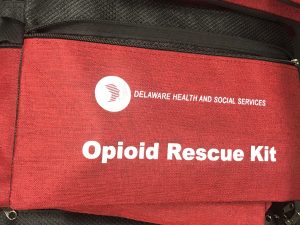NEW CASTLE (July 21, 2020) – The Delaware Department of Health and Social Services (DHSS) today announced the launch of ATLAS™, the first resource of its kind to help those looking for addiction treatment find high-quality and appropriate care. This online platform, www.TreatmentATLAS.org, provides the public and decision makers across the state with transparent data on the use of evidence-based medical practices and patient experiences at addiction treatment facilities. ATLAS will empower Delawareans to seek the treatment that is most likely to put them on the path to recovery at a time when it is more necessary than ever.
ATLAS also will support statewide improvement in the quality of addiction treatment by democratizing data for use by the facilities to inform quality improvement initiatives by health care payers, such as employers and insurers, to align market forces with best practices. State officials will be able to disseminate resources and design future interventions. In Delaware, for the first six months of 2020, 190 people have died from suspected overdoses, according to the Delaware Division of Forensic Science. That’s about a 47% increase over the same 6 months in both 2018 and 2019. In all of 2019, Delaware reported 431 overdose deaths – up 8% from the total for 2018. “We are grateful for this partnership with Shatterproof to provide Delaware families with this online resource where they can find high-quality and trusted addiction treatment,” Delaware Governor John Carney said. “Getting people to the right care at the right time can help save lives and move more Delawareans into active and long-term recovery.”
Delaware is one of six states that has partnered with Shatterproof, a national nonprofit organization dedicated to reversing the addiction crisis in America, to develop and launch ATLAS.
“When my family was looking for addiction treatment for my son Brian, the system was impossible to navigate. If ATLAS was available, I believe we could have found evidence-based treatment and my son might be alive today,” said Gary Mendell, Founder and CEO of Shatterproof. “As I look forward as to how ATLAS will help so many people in need and their loved ones and as I learn more about how the COVID-19 pandemic is aggravating the already existing addiction public health crisis, it is so important that we make ATLAS available to everyone in Delaware and across the country.”
“We are worried about the impact that COVID-19 is having on Delawareans who already are struggling with substance use disorder,” said Delaware Department of Health and Social Services (DHSS) Secretary Dr. Kara Odom Walker, a practicing family physician. “For Delaware families who are trying to navigate treatment services for their loved ones, this new tool from Shatterproof will help them find evidence-based, high-quality care that they can trust.”
ATLAS measures addiction treatment facilities’ use of best practices through a combination of validated data sources and reports them publicly. It enables the end-user to search and filter using different criteria and includes an expert-agreed upon Addiction Treatment Needs Assessment to help guide the search based on the individual’s needs. Recognizing that consumers are not the only market influencer that can propel the quality of the addiction treatment field, ATLAS is also designed for use by state agencies, health insurers and employers to align policies and payment decisions through expert agreed upon best practices. ATLAS enables treatment facilities that voluntarily submit data to benchmark themselves against their peers and design data-driven quality improvement initiatives, making this information transparent to the public in a user-friendly manner. Information is also made transparent to providers, payers, and states in a way that can drive quality improvement.
While all addiction treatment facilities across Delaware are listed on ATLAS, 64.7% of the facilities voluntarily reported on their services and practices. ATLAS also includes feedback from other patients once a minimum threshold of 20 responses per facility is met. This data updates every 24 hours.
In Delaware, individuals and families who are struggling with substance use disorder or mental health issues, can call the 24/7 Delaware Hope Line at 1-833-9-HOPEDE (1-833-946-7333). Or they can visit HelpIsHereDE.com, DHSS’ clearinghouse website, for a connection to treatment and recovery services and supports in Delaware or nearby states.
Finding addiction treatment can be extremely difficult. ATLAS is a trusted resource to help make this process easier. Join Shatterproof on July 21, 2020, as it celebrates the launch of ATLAS, an innovative new platform for locating appropriate, high-quality addiction treatment.
